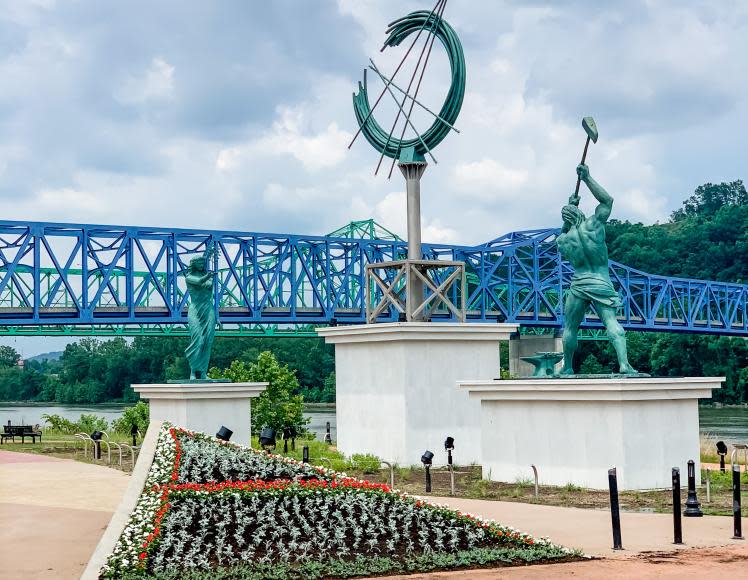Ashland, Kentucky: A City Steeped in History and Natural Beauty
Related Articles: Ashland, Kentucky: A City Steeped in History and Natural Beauty
Introduction
In this auspicious occasion, we are delighted to delve into the intriguing topic related to Ashland, Kentucky: A City Steeped in History and Natural Beauty. Let’s weave interesting information and offer fresh perspectives to the readers.
Table of Content
Ashland, Kentucky: A City Steeped in History and Natural Beauty

Ashland, Kentucky, nestled on the banks of the Ohio River, is a city rich in history, culture, and natural beauty. Its strategic location at the confluence of the Ohio and Big Sandy Rivers has played a vital role in shaping its identity, making it a hub for commerce, industry, and tourism. This article delves into the geographical, historical, and cultural aspects of Ashland, offering a comprehensive understanding of this vibrant city.
Geography and Topography
Ashland is situated in the northeastern part of Kentucky, bordering the state of West Virginia. The city is nestled in the foothills of the Appalachian Mountains, with the Ohio River flowing along its eastern edge. This unique location provides a mix of rolling hills, riverfront landscapes, and scenic views. The city’s topography influences its climate, providing mild summers and cool, snowy winters.
Historical Significance
Ashland’s history is deeply intertwined with the development of the Ohio River Valley. The area was inhabited by Native American tribes, including the Shawnee and Cherokee, before European settlement. In the 18th century, European settlers began arriving, drawn by the fertile land and the river’s potential for transportation.
The city’s name, originally "Poage’s Landing," was changed to Ashland in honor of Henry Clay, a prominent statesman known as "The Great Compromiser," whose estate was located nearby. The city’s growth was fueled by its strategic location on the Ohio River, which served as a vital transportation route for trade and commerce.
Economic Development
Ashland’s economy has historically been driven by industries such as coal mining, steel production, and manufacturing. The city’s location near abundant natural resources made it a center for these industries, contributing significantly to its growth and development. While these industries have undergone significant changes in recent years, Ashland continues to diversify its economic base, focusing on sectors such as healthcare, education, and tourism.
Cultural Heritage
Ashland boasts a rich cultural heritage, reflected in its vibrant arts scene, historical landmarks, and community events. The city is home to the Paramount Arts Center, a historic theater that hosts a variety of performances, including concerts, plays, and dance recitals. The Ashland Area Arts Council supports and promotes artistic endeavors, fostering a thriving creative community.
Education and Institutions
Ashland is home to several institutions of higher learning, including the prestigious Morehead State University and the Ashland Community and Technical College. These institutions play a vital role in educating the local workforce, fostering research, and contributing to the city’s intellectual and cultural landscape.
Tourism and Recreation
Ashland offers a variety of attractions for visitors, ranging from historical sites to scenic natural landscapes. The Ashland Transportation Museum showcases the city’s rich transportation history, while the Paul G. Blazer Park offers a picturesque setting for recreation and relaxation. The city also boasts several hiking trails, including the scenic Carter Caves State Resort Park, which offers a unique opportunity to explore the region’s natural wonders.
FAQs
1. What is the population of Ashland, Kentucky?
As of the 2020 census, the population of Ashland is approximately 20,735.
2. What is the climate like in Ashland, Kentucky?
Ashland experiences a humid subtropical climate with four distinct seasons. Summers are typically warm and humid, while winters are cool and often snowy.
3. What are some of the major industries in Ashland, Kentucky?
While traditional industries such as coal mining and manufacturing have declined, Ashland’s economy is diversifying with growth in healthcare, education, and tourism.
4. What are some of the notable landmarks in Ashland, Kentucky?
Some notable landmarks include the Paramount Arts Center, the Ashland Transportation Museum, and the Paul G. Blazer Park.
5. What are some of the best places to eat in Ashland, Kentucky?
Ashland offers a variety of dining options, from casual eateries to fine dining establishments. Some popular choices include the Coal Miners Daughter Restaurant, the Highlands Bar and Grill, and the City Limits Cafe.
Tips
1. Visit the Paramount Arts Center: This historic theater hosts a variety of performances and is a cultural gem of Ashland.
2. Explore the Ashland Transportation Museum: Learn about the city’s rich transportation history through exhibits showcasing trains, streetcars, and other modes of transportation.
3. Hike the Carter Caves State Resort Park: Discover the beauty of the Appalachian Mountains with scenic hiking trails and unique cave formations.
4. Enjoy the Ohio Riverfront: Take a stroll along the riverfront and enjoy the scenic views of the Ohio River.
5. Attend the annual Ashland Independent Film Festival: Experience the vibrant film scene in Ashland and support local filmmakers.
Conclusion
Ashland, Kentucky, is a city with a rich history, vibrant culture, and stunning natural beauty. Its strategic location, diverse economy, and commitment to education and the arts make it a thriving and welcoming community. Whether you are interested in history, culture, or outdoor recreation, Ashland offers something for everyone. By embracing its heritage and fostering innovation, Ashland continues to evolve as a dynamic city with a promising future.








Closure
Thus, we hope this article has provided valuable insights into Ashland, Kentucky: A City Steeped in History and Natural Beauty. We thank you for taking the time to read this article. See you in our next article!